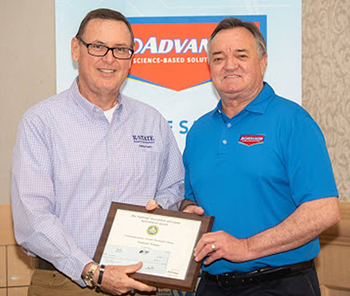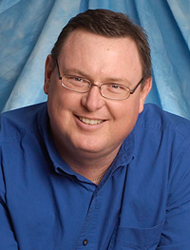Dennis Patton Wins National Communications Award
Horticulture Agent
Local lawn and garden expert wins national award
 If you ask Dennis Patton, horticulture agent for Johnson County K-State Research and Extension, whether he has a favorite movie he might just say, “The Seven Year Itch.” After all, it was exactly seven years ago when Patton won, for the first time, the National Association of County Agricultural Agents award as the top columnist in the nation.
If you ask Dennis Patton, horticulture agent for Johnson County K-State Research and Extension, whether he has a favorite movie he might just say, “The Seven Year Itch.” After all, it was exactly seven years ago when Patton won, for the first time, the National Association of County Agricultural Agents award as the top columnist in the nation.
Patton has now received his second communications award, presented to him at the NACAA’s week-long annual meeting and professional development conference held this past July in Tennessee. The association, which includes the nation’s horticulture agents, honored Patton for his writings for The Kansas City Star’s special “GROW” sections that were published during the spring and fall seasons. To reach the national level, Patton had to win at both the state and regional level.
Patton has been an agent for K-State Research and Extension for nearly 36 years, having started out as the horticulture agent in McPherson County before moving to Johnson County in 1987. His passion for gardening was learned at his beloved grandmother’s knee on their family farm in southcentral Kansas. But it is his devotion to customer service and extensive horticultural knowledge that has earned him a well-deserved reputation as the go-to lawn and garden expert for the KC metro, and, in some instances, across the country. Patton has been interviewed by The Wall Street Journal, quoted on the CBS Morning Show, and his columns often show up in newspapers around the country.
Besides being responsible for the educational outreach of the lawn and garden program, Patton oversees the Extension Master Gardener (EMG) program of 433 devoted volunteers. In 2017, the EMG’s volunteered 51,223 hours of service to the county through the county’s eight demonstration gardens, gardening hotline, speaker’s bureau, and numerous educational events. The dollar value of their service was worth $1,264,695. While they may not be the largest EMG group, their hours of service are one of the highest in the country. Patton’s extension peers are always astonished at the number of hours his volunteers continually donate, year-after-year to his program.
You would think, after having been in the county so long that Patton would have seen it all. One of K-State Extension’s most popular services is its soil testing program. County extension offices send residents’ soil samples to the university’s lab in Manhattan for analysis. In Johnson County, Patton personally reviews each and every result and writes a personalize report that is sent to the customer. Last year, Johnson County set a new record completing more than 1,500 soil tests.
“It’s kind of to the point where I pretty much know the results before I ever see the lab sheet,” Patton said. “I could practically do them in my sleep.”
But, just last week there was one report that came back that made Patton sit up and do a double take. A resident’s soil analysis showed a pH level of 2. Normal pH levels in the metro range in the mid to upper 7’s.
“Yeah, that really got my attention,” Patton said. “I had to call the lab and confirm that one.”
August, 12, 2018

